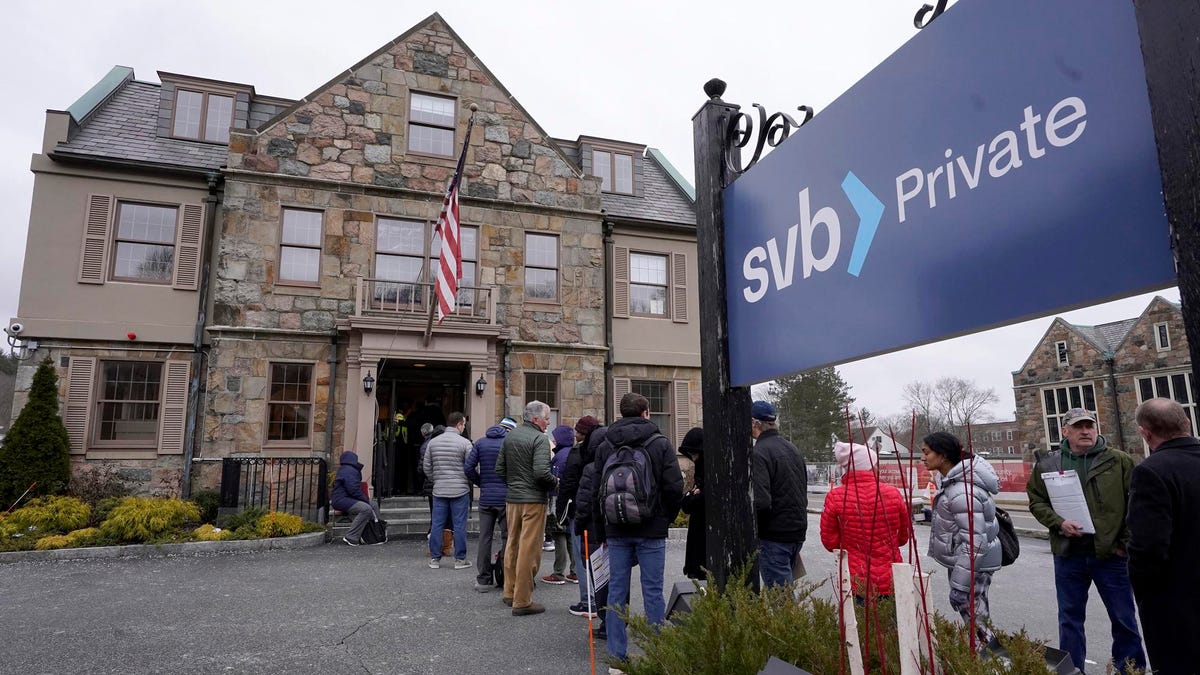As SVB careened towards catastrophe, some 50 founders, VCs, economists and comms experts gathered in a WhatsApp group to draft a memo calling for urgent preservation of its deposits for the sake of the broader economy. Then they sent it to Washington.
Just after 5:30 pm Pacific on Saturday, a memo started making the rounds among policymaker staff. Called “United States Cascade Bank Failure Scenario,” the private document laid out the case for why the U.S. government needed to take “decisive action” to avoid a continued bank run in the wake of the abrupt closure of Silicon Valley Bank.
“Today, most Americans assume the SVB failure is contained to the tech economy, but this is not true,” the document said, before laying out a primer on how SVB collapsed and the dire consequences for inaction — insolvency for regional banks, massive job cuts and the loss of banking services for wide swaths of the country, far from Silicon Valley. “The risks to the U.S. economy could be sudden, severe, and extensive,” it warned.
Whereas some prominent voices in tech took to Twitter for all-caps concern tweets, the memo was unsigned, but it was authored by a coterie of almost 50 leaders within and beyond the tech ecosystem. From Thursday through the weekend, they crowd-sourced information and coordinated ad hoc outreach to staffers in the California governor’s office, the White House, and to lawmakers like Ro Khanna, Katie Porter, Elizabeth Warren and JD Vance.
Renamed repeatedly but ultimately called “Stop Bank Failure Cascade,” the WhatsApp group included tech luminaries such as Bloomberg Beta head Roy Bahat, The Lean Startup author Eric Ries, Initialized partner Kim-Mai Cutler and Y Combinator CEO Garry Tan. While its membership varied widely in job title, personal politics and clout, it shared a singular goal: to make the case that the government should take immediate action on SVB, and the policy positions to support it.
Members of the group admitted that their own financial self-interest was also at stake. But they insisted that concern about wider consequences for the U.S. economy and its citizens was their primary motivation. “There was a contingent from my world who were like, ‘I want my money back’ people. This group was not those people,” Zack Rosen, cofounder of software startup Pantheon and one of the driving forces behind the group, told Forbes. Tinycare CEO Michael Lai, agreed: “Everyone deeply believes that Teddy Roosevelt quote,” he said. “The government is us; we are the government, you and I.”
How much, if any, direct influence the group actually had on the FDIC’s Sunday announcement that it would protect all SVB deposits is hard to measure. “Stop Bank Failure Cascade” circulated its memo just hours before officials reportedly reached tentative agreement on that plan.
But according to one source familiar with high-level government discussions and access to the memo, it certainly didn’t hurt. Public warnings of the possibility of debilitating damage to the innovation economy weren’t resonating outside of Silicon Valley. “People saw it as a 10% haircut on deposits, not a run on tech companies. That sounded like exaggerated self-pleading,” this person said.
The “Stop Bank Failure Cascade” memo may well have found a beltway reader that helped change that perception. Documents viewed by Forbes suggest the group was confident it had reached the offices of 20 or so key stakeholders in the decision by Saturday; the group’s organizers told Forbes they estimated the memo, shared via Google Doc, Bitly link and PDF, was accessed by more than 200 people — mostly policy staff for the politicians, who likely didn’t see the memo directly, and external advisers such as economists and former staffers.
The WhatsApp group memo focused more on the risk to the broader economy, to its credit, the person added. “The idea that it would destroy other banks was more powerful,” they said. “And those arguments won the day. In any intense policy situation, that’s about as good as it gets.”
A spokesperson for Khanna’s office said the congressman had not seen or reviewed such a memo, nor had his staff. A White House spokesperson was unable to confirm receipt by any of its staff at the time of publication. Newsom’s office did not respond to a comment request. Tan declined to comment through a Y Combinator spokesperson.
From Private Memo To Open Letter
For the core contributors to “Stop Bank Failure Cascade,” a weekend WhatsApp working group was nothing new. Rosen co-created an organization called Covid Act Now, which modeled the potential spread of the coronavirus, in March 2020, sending it to state legislators across the country. After a call from a government agency, the group helped provide analytics for the first month of the federal response. “Just like now, it was nerds on laptops, freaking out, who had some understanding of how government works,” he said. Bahat, a one-time mayor’s office staffer in New York, worked on a Covid-19 leadership group. Others previously knew each other through a community organized by member Misha Chellam, leader of Effective Government California, and a Stanford group called the First Principles Forum.
“Whenever something like this happens, it’s important to have a civic perspective and response. If you don’t do that, the worst people end up being the spokespeople and face of it,” says Ries, who has also participated in project groups to source protective equipment during the early Covid response, to address fire safety and air quality, and who once advised the turbulent launch of Healthcare.gov. “As soon as I saw the bank run happen, I said, ‘Let’s do something more constructive than destroying our banking partner on Twitter.’”
The WhatsApp chat kicked off on Friday as founders and VC firms began to withdraw funds from SVB en masse, or tried unsuccessfully. It shifted into action after SVB’s closed the next day, and prominent business figures such as investors Bill Ackman and David Sacks tweeted dire warnings of an impending bank run contagion barring immediate intervention. In came Tan, supplying government officials with Y Combinator data on the number of jobs at stake – especially outside of California – and sharing a public petition of founders and tech leaders calling for help. Others joining the chat also included Noah Smith, author of the popular economics newsletter Noahpinion.
The group reached consensus that many in Washington, D.C., as well as the general public, wouldn’t be sympathetic to the tech industry’s concerns for their own sake, said Bahat.
By Sunday, the WhatsApp group was focused on a public version of the memo they’d already shared around Washington that reinforced the need for regulator action. That effort brought in economists Brad DeLong, a professor at the University of California Berkeley, and Eric Hanushek, a Stanford professor, who signed the open letter alongside Ries. Ninety minutes after the post went live on Sunday, the FDIC announced the action they’d hoped.
Given that turnaround, it’s unlikely the second document had much effect — and it’s unclear if any of the other efforts, from Tan’s petition to venture capitalist Ron Conway’s reported in-person pressure influenced the government’s decision. “I don’t think tech lobbying actually mattered much,” said one tech leader uninvolved with the WhatsApp group who was familiar with other efforts unfolding over the weekend. “I love those guys, but they just don’t have any juice at all. D.C. juice is expensive.”
“I think that’s the wrong way to look at it. If you don’t have that influence, the notion is that you should sit down, shut up and say nothing,” responded Ries. “But that can’t be right. These are people who cared, and demonstrated they cared. Without flexing those civic muscles, you miss the opportunity to bring citizens into the system.”
With First Republic Bank and regional banks still facing challenges, the WhatsApp group remains active. “Broader reform” is needed, according to Lai, such as regulation that could deter future runs. Rosen said he believed the federal government should secure all deposits, at all banks, not just at SVB. The tech industry – and particularly venture capital – also have a reckoning to face about the public’s perception of its social impact and the stewards it chooses to represent it, added Ries.
In the next crisis, some of them, and new faces, will do it again. “There’s now muscle memory for a group of people in tech who want to try to do the right thing,” said Bahat. “A bunch of people get in a WhatsApp group, share what they know. And then someone says, ‘let’s go.’”
MORE FROM FORBES
Read the full article here










